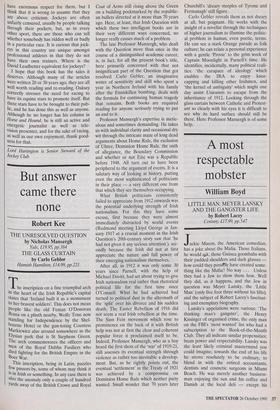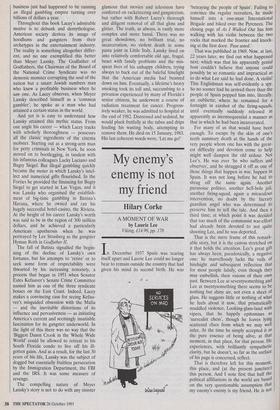A most respectable mobster
William Boyd
LITTLE MAN: MEYER LANSKY AND THE GANGSTER LIFE by Robert Lacey Century, £17.99, pp.547
mil' ackie Mason, the American comedian, has a joke about the Mafia. Those Italians, he would ask, those Guinea goombahs with their padded shoulders and dark glasses how could they possit5ly have created some- thing like the Mafia? No way .. . Unless they had a Jew to show them how. Well they did, as it happens, and the Jew in question was Meyer Lansky, the 'Little Man' (only five foot three without his lifts), and the subject of Robert Lacey's fascinat- ing and exemplary biography. .
Lansky's appelations were various: 'The thinking man's gangster', the Henry Kissinger of organised crime, the only man on the FBI's 'most wanted' list who had a subscription to the Book-of-the-Month Club. They all indicate similar propensities: brain power and respectability. Lansky was the least likely criminal mastermind you could imagine; towards the end of his life he strove resolutely to be ordinary, to blend in with the retired accountants, dentists and cosmetic surgeons in Miami Beach. He was merely another business- man enjoying the sun and his coffee and Danish at the local deli — except his business just had happened to be running an illegal gambling empire turning over billions of dollars a year.
Throughout this book Lacey's admirable motive is to debunk and demythologise. American society derives its image of hoodlums and gangsters from their archetypes in the entertainment industry. The reality is something altogether differ- ent, and no one exemplified this better than Meyer Lansky. The Godfather of Godfathers, the Chairman of the Board of the National Crime Syndicate was no demonic monster corrupting the soul of the nation but a smart Jewish numbers man who knew a profitable business when he saw one. As Lacey observes, when Meyer Lansky described himself as a 'common gambler', he spoke as a man who had attained a certain status in the world.
And yet is is easy to understand how Lanky attained this mythic status. From one angle his career — which Lacey tracks with scholarly thoroughness — possesses all the classic ingredients of the cinema mobster. Starting out as a strong-arm man for petty criminals in New York, he soon moved on to bootlegging, in tandem with his infamous colleagues Lucky Luciano and Bugsy Siegel. But illegal gambling quickly became the metier in which Lansky's intel- lect and numerical gifts flourished. In the Forties he provided the financing for Bugsy Siegel to get started in Las Vegas, and it was Lansky who organised the establish- ment of big-time gambling in Batista's Havana, where he owned and ran his hugely successful hotel-casino, the Riviera. At the height of his career Lansky's worth was said to be in the region of 300 million dollars, and he achieved a particularly American apotheosis when he was portrayed by Lee Strasberg as the gangster Hyman Roth in Godfather II.
The fall of Batista signalled the begin- ning of the decline of Lansky's own fortunes, but his attempts to 'retire' or to seek some form of respectability were thwarted by his increasing notoriety, a process that began in 1951 when Senator Estes Kefauver's Senate Crime Committee named him as one of the three syndicate bosses on the East Coast. Indeed, Lacey makes a convincing case for seeing Kefau- ver's misguided obsession with the Mafia — and the inevitable distortions of its influence and pervasiveness — as initiating America's current and seemingly insatiable fascination for its gangster underworld. In the light of this there was no way that the `Biggest Damn Crook in the Whole Wide World' could be allowed to retreat to his South Florida condo to live off his ill- gotten gains. And as a result, for the last 30 years of his life, Lansky was the subject of dogged but essentially fruitless persecution by the Immigration Department, the FBI and the IRS. It was some measure of revenge.
The compelling nature of Meyer Lansky's story is not to do with any sinister glamour that movies and television have conferred on racketeering and gangsterism, but rather with Robert Lacey's thorough and diligent removal of all that gloss and glitter. The truth, as always, is vastly more complex and more banal. There was no great showdown, no brilliant trial, no incarceration, no violent death in some pasta joint in Little Italy. Lansky lived on into relatively comfortable old age, frugal, beset with family problems and the mis- spent lives of his unhappy children, trying always to back out of the baleful limelight that the American media had beamed down on him. Eventually, a lifetime's heavy smoking took its toll and, succumbing to a privation experienced by many of Florida's senior citizens, he underwent a course of radiation treatment for cancer. Progress- ively weaker, he was admitted to hospital at the end of 1982. Distressed and sedated, he would pluck fretfully at the tubes and drips feeding his wasting body, attempting to remove them. He died on 15 January, 1983. His last coherent words were, 'Let me go!'









































 Previous page
Previous page